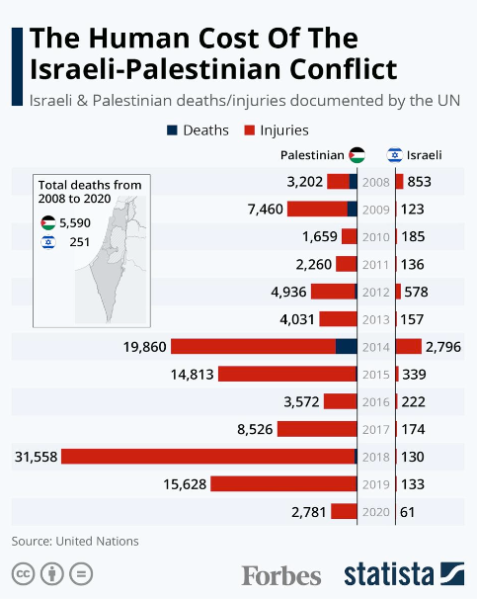On October 7th, 2023, the militant group Hamas launched a brutal attack on Israel. The group launched thousands of rockets towards Israel before they penetrated Israel’s border defenses and sent militants into Israeli territory. Sources estimate that at least 1400 Israelis died, and nearly 200 Israelis are detained in Gaza. The Israeli Government retaliated with airstrikes on Gaza that killed more than 2,700 Palestinians. Israeli military mobilization alludes to an impending ground operation in Gaza, as Israeli Prime Minister Benjamin Netanyahu has vowed to “demolish Hamas.”
Brief History of the Israeli- Palestinian Conflict and Modern Day Implications
A nearly 200-year-old historical and geopolitical context explains the unfolding crisis between Israel and Palestine, the notion of statehood at the core of this conflict. The late nineteenth century saw the Zionist movement propel the call for “restoration of the Jewish State” and the creation of the Jewish homeland in Ottoman-controlled Palestine.
The Ottomans ruled Palestine until 1917, when at the end of World War I administrative control over Palestine was acquired by Britain. The 1917 Balfour Declaration promised a “national home for the Jewish people in Palestine.” The Arab community in Palestine opposed the push for a Jewish “national home,” while the Jewish community saw the region as their ancestral home. Tensions and violence have escalated since the 1920s.
The Nazi persecution and the Holocaust in Europe led to large-scale Jewish immigration into Palestine. In 1947, the United Nations proposed to divide Palestine into separate Arab and Jewish states. The United Nations General Assembly Resolution 181 was passed after the end of World War II, offering two independent states, Arab and Jewish, with Jerusalem under “UN Trusteeship.” The United Nations Partition Plan for Palestine was recognized by the Jews but rejected by the Arabs.
In May 1948, Israel became an independent state. The region immediately saw the first Israel-Arab war between Israel and Jordan, Egypt, Syria, Lebanon, and Iraq. The Holy Land, the home to the world’s three major religions, Christianity, Islam, and Judaism, saw a series of Arab-Israeli wars throughout the 20th century that frequently changed the political map of the region:
1948: The first war between Israel and Arab forces.
1956: The Suez War: Between Israel, Britain, France and Egypt.
1967: The Six-Day-War: Between Israel and Egypt, Jordan
1973: Yom Kippur War: Between Israel and Egypt
1987: Hamas founded, a militant outfit that has controlled Gaza since the 2006 elections.
These political conflicts have led to widespread displacement of Palestinians. Most Palestinian refugees live in Gaza and the West Bank and are prohibited by the Israeli government from returning to their homes. More than 2 million Palestinians live in Gaza, a narrow strip of land between Egypt and Israel. The 140-square-mile densely populated territory has often been called the world’s largest open-air prison “due to the virtual immobility of its population” (PBS, 2007). The region has seen devastating civilian fatalities.

In wake of the recent Hamas attack, the Gaza Health Ministry reported that “2,778 Palestinians have been killed and 9,700 wounded in Gaza. Another 1,200 people across Gaza are believed to be buried under the rubble, alive or dead.” Secretary Blinken reiterated the U.S.’ unequivocal support to Israel in a Press Conference in Tel Aviv. “Hamas doesn’t represent the Palestinian people or their legitimate aspirations to live with equal measures of security, freedom, justice, opportunity, and dignity” he stated. President Biden expressed his outrage, denouncing the attack on civilians at the Gaza Al Ahli Arab hospital explosion that killed 471 people. The cause for the explosion remains contested. “Israeli officials and Palestinian militants blame each other for the Al-Ahli Arab explosion” (New York Times, October 2023). Egypt has agreed to open the Rafah crossing to allow up to 20 aid trucks into Gaza amid a looming humanitarian crisis.
Mr. Wennesland, UN Special Coordinator for the Middle East Peace Process, echoes former Secretary-General Ban Ki-Moon’s 2014 warning that Gaza is on a “knife-edge.” He said, “I fear that we are at the brink of a deep and dangerous abyss that could change the trajectory of the Israeli-Palestinian conflict, if not of the Middle East as a whole…The risk of an expansion of this conflict is real – very, very real – and extremely dangerous.”

